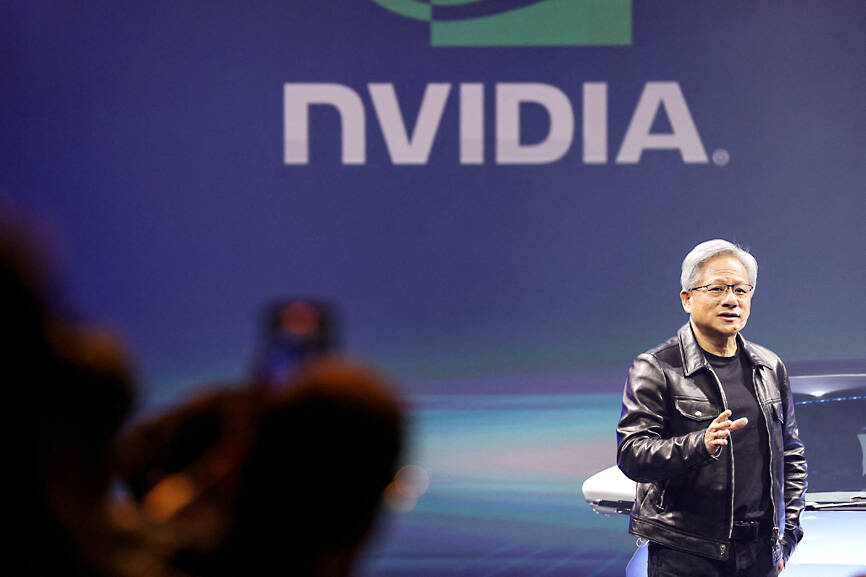US giant Nvidia Corp, the world’s most valuable chipmaker, is selling a less-capable version of its best graphics product for video gamers in China, after Washington tightened restrictions on what the company can market in that country.
The version of the GTX 4090 D chip that is listed for sale on Nvidia’s China Web site has about 10 percent fewer processing cores than the 4090 that is sold in other countries.
“The GeForce RTX 4090 D has been designed to comply with US government export controls and will only be available at retail in China,” a Nvidia spokesperson said in an e-mail.

Photo: I-Hwa Cheng, AFP
The company’s chief executive officer Jensen Huang (黃仁勳) has said he would produce versions of his market-leading products for China that comply with rules imposed by the administration of US President Joe Biden on exports to that country.
The US, seeking to slow down the advancement of China’s artificial intelligence (AI) capabilities, is limiting access to specialized chips in that market.
The company said it “extensively engaged” with the US government while developing the graphics product, which is to be available next month.
Compared with the 4090 sold elsewhere, the China model will also have fewer processing subunits that are useful for accelerating AI workloads, Nvidia said.
US officials, who have cited national security concerns, are more interested in Nvidia’s AI accelerators, a range that is currently topped by the H100. That type of chip, which is based on technology used in graphics cards, has become the basis of an explosion in AI-capable hardware by owners of large data centers.
When US export rules were tightened last year, Nvidia introduced less capable versions of its chips for China. The US clamped down again in October by further reducing performance thresholds. Nvidia’s leadership responded by saying the company would again redo its offerings for the Asian country, the largest market for chips, to make them compliant with the new rules.
Nvidia shares rose less than 1 percent to US$497.10 at 12:25pm local time in New York. The stock has more than tripled this year, making Nvidia by far the best-performing semiconductor stock this year and the industry’s first company with a market value of US$1 trillion.

Application-specific integrated circuit designer Faraday Technology Corp (智原) yesterday said that although revenue this quarter would decline 30 percent from last quarter, it retained its full-year forecast of revenue growth of 100 percent. The company attributed the quarterly drop to a slowdown in customers’ production of chips using Faraday’s advanced packaging technology. The company is still confident about its revenue growth this year, given its strong “design-win” — or the projects it won to help customers design their chips, Faraday president Steve Wang (王國雍) told an online earnings conference. “The design-win this year is better than we expected. We believe we will win

Intel Corp chief executive officer Lip-Bu Tan (陳立武) is expected to meet with Taiwanese suppliers next month in conjunction with the opening of the Computex Taipei trade show, supply chain sources said on Monday. The visit, the first for Tan to Taiwan since assuming his new post last month, would be aimed at enhancing Intel’s ties with suppliers in Taiwan as he attempts to help turn around the struggling US chipmaker, the sources said. Tan is to hold a banquet to celebrate Intel’s 40-year presence in Taiwan before Computex opens on May 20 and invite dozens of Taiwanese suppliers to exchange views

Chizuko Kimura has become the first female sushi chef in the world to win a Michelin star, fulfilling a promise she made to her dying husband to continue his legacy. The 54-year-old Japanese chef regained the Michelin star her late husband, Shunei Kimura, won three years ago for their Sushi Shunei restaurant in Paris. For Shunei Kimura, the star was a dream come true. However, the joy was short-lived. He died from cancer just three months later in June 2022. He was 65. The following year, the restaurant in the heart of Montmartre lost its star rating. Chizuko Kimura insisted that the new star is still down

While China’s leaders use their economic and political might to fight US President Donald Trump’s trade war “to the end,” its army of social media soldiers are embarking on a more humorous campaign online. Trump’s tariff blitz has seen Washington and Beijing impose eye-watering duties on imports from the other, fanning a standoff between the economic superpowers that has sparked global recession fears and sent markets into a tailspin. Trump says his policy is a response to years of being “ripped off” by other countries and aims to bring manufacturing to the US, forcing companies to employ US workers. However, China’s online warriors